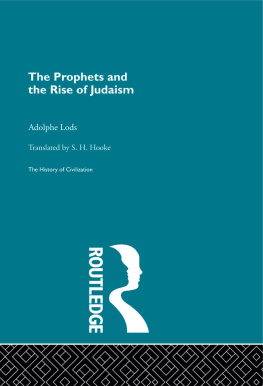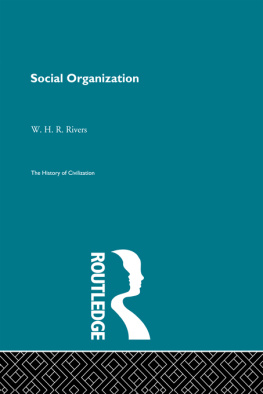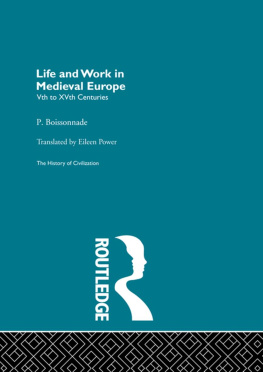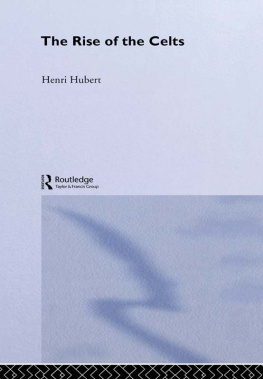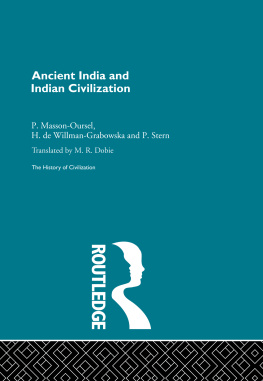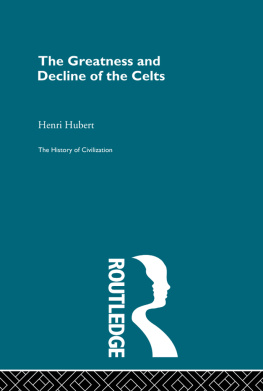THE HISTORY OF CIVILIZATION
THE PROPHETS AND THE RISE OF JUDAISM
THE HISTORY OF CIVILIZATION
General Editor C. K. Ogden
The History of Civilization is a landmark in early twentieth Century publishing. The aim of the general editor, C. K. Ogden, was to summarise in one comprehensive synthesis the most recent findings and theories of historians, anthropologists, archaeologists, sociologists and all conscientious students of civilization. The History, which includes titles in the French series LEvolution de lHumanite, was published at a formative time in the development of the social sciences, and during a period of significant historical discoveries.
A list of the titles in the series can be found at the end of this book.
PLATE I
First published in 1937 by Routledge, Trench, Trubner
Reprinted 1996, 2000
2 Park Square, Milton Park,
Abingdon, Oxon, OX14 4RN
&
270 Madison Ave,
New York NY 10016
Transferred to Digital Printing 2008
Routledge is an imprint of the Taylor & Francis Group
1996 Routledge
All rights reserved. No part of this book may be reprinted or utilized in any form or by any means electronic, mechanical, or other means, now known or hereafter invented, including photocopying and recording, in any information storage or retrieval system, without permission in writing from the publishers.
British Cataloguing in Publication Data
ISBN: 0-415-15597-5
ISBN Judaeo Christian Civilization
(4 volume set): 0-415-15615-7
ISBN History of Civilization (50 volume set): 0-415-14380-2
ISBN 978-1-136-20156-1 (ePub)
Publishers Note
The publisher has gone to great lengths to ensure the quality of this reprint but points out that some imperfections in the original may be apparent
THE CONSTITUENT ELEMENTS OF JUDAISM PROPHETIC INSPIRATION AND LEGALISM
I T may seem a platitude to say that the importance of historical events is not necessarily in proportion to the space which they occupy on the earths surface. But it is a platitude which is no less true of the small Jewish people than of the equally small Greek people. Hence it will not be a matter of surprise that, since we have devoted six volumes to Hellenism, we should also have thought it fit to devote three to Judaism and, six in all to the origins of Christianity. In the words of Renouvier quoted in the Foreword to Israel, the attitude of spirit of that body of nomad Bedouins, the Hebrews, produced those extraordinary religious phenomena which still exercise a potent influence among us, after four thousand years.
We have divided the volume which had been assigned to the subject of From the Prophets to Jesus into two. In the present volume A. Lods has carried the history of Israel which, in his book Israel he had traced up to the middle of the eighth century, from Amos to Judas Maccabus. These six centuries of political and religious conflict provide him with a varied and intricate subject-matter. In the companion volume C. Guignebert, dealing with the conditions obtaining in Palestine and the Jewish world in general at the beginning of the Christian era, will carry on the history of Israel and at the same time provide a necessary introduction to his book Jesus.
Readers of Lods first volume, Israel, will find in the present volume the same qualities which made the first so valuable. There is here the same ample scholarship which is never allowed to obscure the balance and clarity of his discussion, a similar analysis of difficult passages and conflicting interpretations, always resulting in a convincing explanation, or, as in many cases, a cautious suspension of judgment. Readers may be assured that they can find no safer guide through the maze of facts and ideas characteristic of this period.
As in the case of Israel, the present volume is linked up with the preceding ones which dealt with the place of the Eastern Empires in the evolution of humanity. in the stormy period whem empires followed or overthrew one another, when the march of civilization was accompanied by internecine warfare, savage reprisals, destruction of cities, and the transportation of entire populations.
First of all Assyria inflicted sanguinary defeats upon the two kingdoms, the allies of Egypt, as from time to time they attacked or revolted against the empire of spoliation (p. 157). The Israelite colonists, settled in Mesopotamia and Media were replaced by various elements, Syrians, Chaldeans, Elamites, and Arabs. In 701 the tentacles of the empire fastened on a portion of Judah, and 200,150 men, women, and children were carried away captive by Sennacherib (p. 33). The result of the resistance of Hezekiah was diminished territory, decimation of the population, a ravaged country, and an impoverished treasury (p. 36). From this time onward the King of Judah was one of the numerous vassals who experienced, voluntarily or involuntarily, the Assyrian peace . During his long reign Manasseh remained in abject submission to the masters of the world (p. 38).
Nevertheless, it was a precarious peace. Egypt and Chaldea revolted and regained their freedom : the invasion of the barbarian Scythians swept over Asia ; the Assyrian Empire rapidly declined : Nineveh, the bloody city, fell (p. 43). About 622, during the reign of Josiah, Judah gradually recovered its independence and its domination over the ancient kingdom of Israel. But from 609 onward, the series of disasters begins again (p. 43). Egypt, which had become the ally of Assyria in order to ward off the barbarian inroads, slew Josiah at Megiddo, and subjugated Judah.
The downfall of the kingdom of Judah was completed by the Neo-babylonian or Chaldean empire. Nebuchadnezzar, on the occasion of his first capture of Jerusalem, according to one account carried away 3,023 captives, according to another 10,000 (597). Nevertheless, he allowed the country to retain its independence. After a short respite a coalition brought about by Egypt, in which Judah took part, led to the resumption of the siege by the Chaldeans. Jerusalem was taken, sacked, and laid waste (556). After numerous executions a body of 832 captives (?) joined those who had been deported in 597. Only the country folk and the poor were left in the land. But, as the result of several rebellions, many of the Jews fled to Egypt, and in 581 745 more were deported to Babylon. The political existence of Israel had come to an end. (p. 50).
Lods points out, however, that in spite of everything the population which clung to the soil in a state of comparative destitution must have represented three-fourths of the population of Judah (p. 174). Only the pick of them had been deported. Hence some allowance must be made for exaggeration in the prophetic picture of the Exile. The deportation was not merely intended to weaken the conquered country, but to strengthen that of the conquerors. In order to make the best use of this picked body of immigrants they were carefully handled. The Jewish colonies of Babylonia quickly became prosperous (p. 179). They regarded themselves as the true Israel, the nucleus of the future people of Jahweh.

